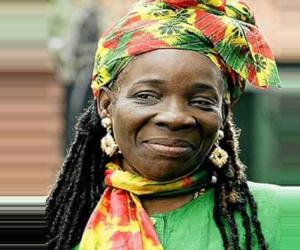
That’s what pulled my interest, the powerful history that hadn’t been taught to me in school.” “Then I started to wear my nurse’s uniform, and tied a rope of red, gold, and green (the Rasta colours) around my waist, and people began to whisper, ‘You know she’s crazy, she’s getting crazy, what a shame after all the money her aunty spend on her’.” But, for Rita, the appeal of Rastafari was its sanity: “The whole thing seemed intelligent to me it wasn’t just about smoking herb, it was more a philosophy that carried a history with it. Rita Marley journeyed through Rastafari to a consciousness of Africa that redeemed the ‘blackie’ in ‘blackie tootus.’ She recalled the widespread alarm her uncharacteristic behaviour provoked when she sighted Rastafari: Her travels took her to another place of origins, the African continent. Though Rita Marley did get out of Trench Town, she never forgot her roots. Sometime, somehow, I’m gettin’ out of here.” THE PULL OF HISTORY I know what I’m gonna try in life, I know this Trench Town thing is not gonna be my last days. She asserts, “Because I know how I feel about myself. But when ‘tutus’ is combined with ‘blackie’ it becomes an insult that motivated Rita to define her identity on her own terms. The Dictionary of Jamaican English defines tutus as ‘a darling, a pet’. Jamaica has a long history of colour consciousness and racial struggle.” I learned discrimination early and underestimated my own value because of my colour. In “Trench Town Rock”, the very first chapter of the autobiography, Rita recalls the cruel insecurities of childhood: “Because I was very dark-skinned, the kids in school called me ‘blackie tootus’ …. Rita tells a powerful story about her escape from the limitations imposed on a poor black girl in Jamaica in the 1940s. Like Marcia Griffiths and Judy Mowatt, the other two members of the I-Three, Rita was able to launch her successful solo career, independent of star-boy Bob. So I also hear my voice, I also hear me.” Rita is more than a back-up singer. But I hear more, because I’m on almost all of the songs. Then, Rita immediately insisted that her own voice must also be heard: “And one interesting thing about it, to me, is that most people only hear him. Because you do really hear his voice wherever you go. Rita first acknowledged Bob Marley’s overpowering voice: “So if I hear his voice now, it’s only confirming that he’s always around, everywhere. She rejected the role of an anonymous ‘someone.’ Right from the “Prologue”, she firmly set the record straight. Rita Marley did not allow herself to be silenced. It is also a moving and inspiring story of a marriage that survived both poverty and then the strains of celebrity.” The anonymous writer of that dust-jacket blurb should really have added the ‘s’ word, sexism. In a remarkably shameless manoeuvre, the publishers of the book opportunistically marketed Rita’s autobiography in this way: “Full of new information, ‘No Woman, No Cry’ is an insightful biography of Marley by someone who understands what it meant to grow up in poverty in Jamaica, to battle racism and prejudice.

Male domination! She is positioned as a mere foil destined to reflect the greater glory of her superstar husband. The book’s title and, even worse, its perverse sub-title confirm one of the major forces that Rita had to confront. Her struggles and triumphs are documented in her autobiography, No Woman No Cry: My Life With Bob Marley, published in 2005. Rita Marley’s journey to claim her specialness – her distinctive identity – was not easy at all.

I always felt, as a little baby, that I had something special in me.”

But I was brought up with that dignity and pride of being black and having something in me. No, no, although I was raised in Trench Town. And then I stand for certain principles and respect because I see myself as Black Queen Omega, not just a little skirt or daughter on the corner. In 1983, I interviewed her for Pulse magazine. Like a mystic, Rita Marley intuitively knew she was divinely called to fulfil a queenly mission.

To mark this occasion, she has been dubbed “Mystic of a Queen.” The title is entirely appropriate. Today is Nana Rita Marley’s 75th earthstrong.


 0 kommentar(er)
0 kommentar(er)
